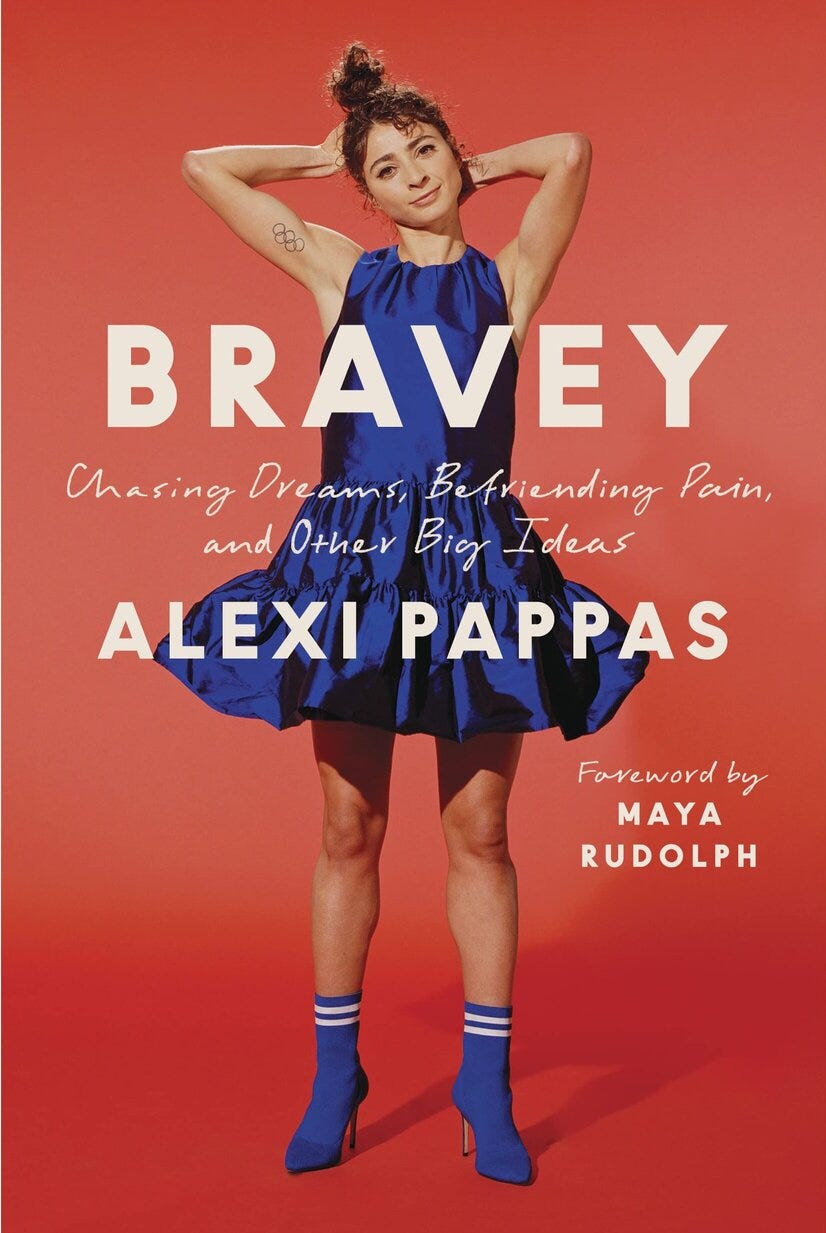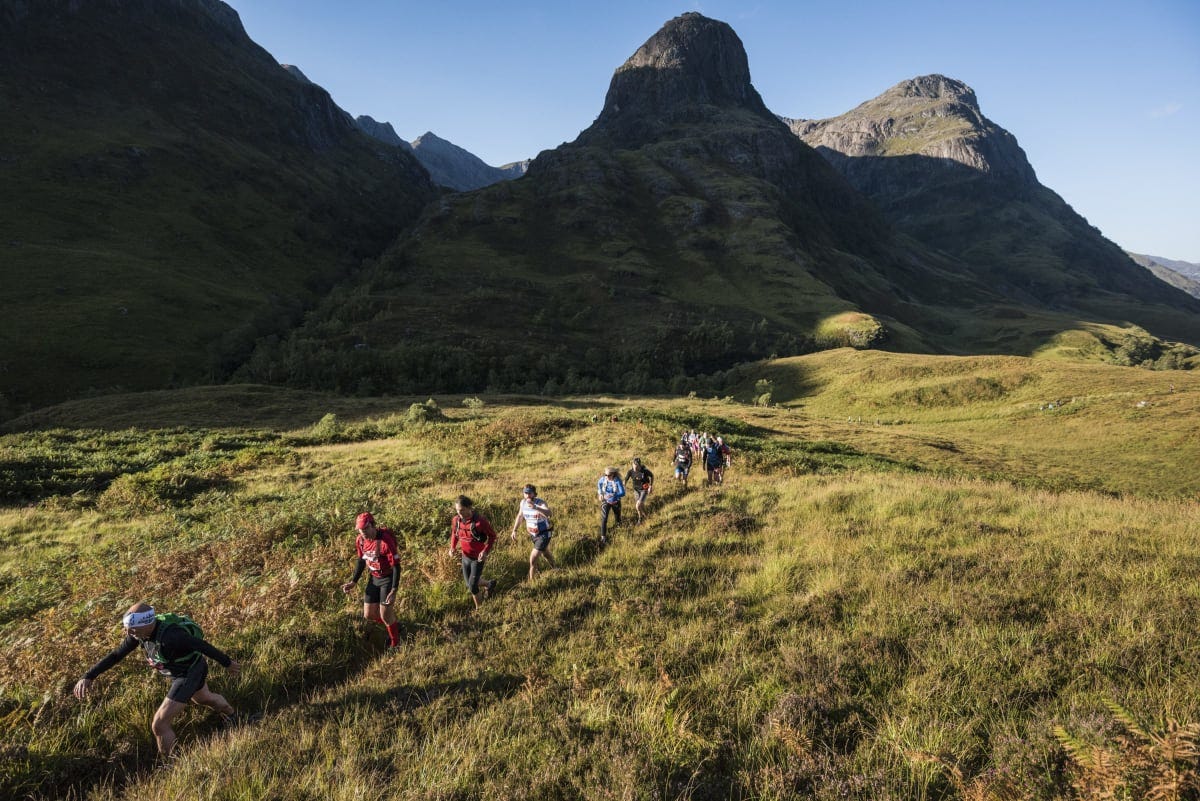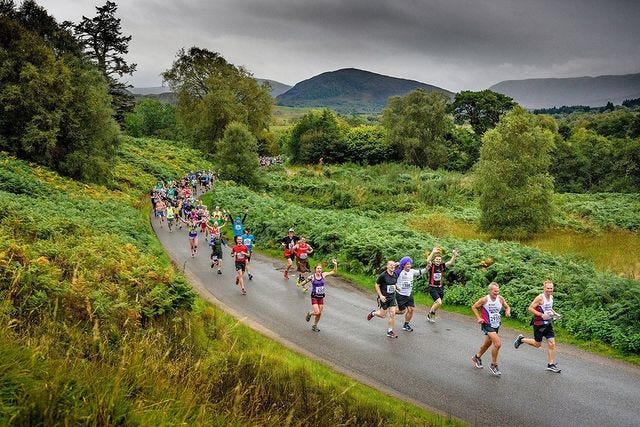On reframing your goals + rewriting your stories
What Alexi Pappas learned from a disappointing marathon + 7 stunning half marathons in Scotland
One of the things I’ve found most difficult to do in my own life is to turn a negative into a positive, to consciously change my view of something bad that happened as something I should be grateful for — or, if I can’t feel good about it, to at least feel neutral. To shake it off.
Maybe it’s because bad always feels stronger than good, or that we feel an obligation not to sugarcoat it when things go wrong. That we know we need to look reality square in the eye, and we shouldn’t shy away from it.
At first, that’s the right response. But it’s easy to dwell too long and get stuck in that place, as Olympic runner, filmmaker and writer Alexi Pappas found when she ran the Chicago Marathon a few years ago and details in her recently released Bravey.
Just two years removed from her Olympic debut at the 2016 Summer Games in Rio de Janeiro, she ran Chicago after starting from a place many of us are familiar with: zero.
She’d experienced injury after injury after the Olympics, which kept her from training anywhere near the level she’d been used to leading up to Rio. Add in a months-long bout with serious depression and it was clear: the wall she was attempting to climb by competing at Chicago was a very high one.
Even though she knew all of those things going into the race, and what they might mean for a competitor at her level, she went forward nevertheless.
Why? Here’s what she wrote in the perfectly titled chapter from the book about it, called “You Make Your Own Cape”:
Running is an individual and a team sport
Yes, of course — when you run, you’re not passing a ball back and forth with a teammate or kicking a ball to anyone. But at races and group runs, you are surrounded by people whose energy you can feel, and who can lift you up in the same way a teammate does — a fact that becomes apparent at the starting line:
“I was at the very front, with thousands of people behind me, all about to tackle the same monumental task together. I thought for a moment about how running is really a team sport masked as an individual sport... and I thought about how I love running in the same way that I love acting, because even though your success in both disciplines is measured by your individual performance, you will be better and find more joy when you build others up and support those around you.”
You get to find out what’s inside
Nearing the halfway point of the marathon, Pappas writes that she began feeling again an old injury she’d experienced years before in her hamstring. She knew it was normal to feel some pain — especially in the 26.2-mile distance — but this was something different, something more.
Slowly, the awareness set in that she wasn’t going to achieve the goal she’d set for herself: to finish Chicago in about 2 hours, 30 minutes. She started to feel embarrassed, as runners in the prime of their careers don’t turn in performances like the one she was about to (or they simply drop out of the race, to avoid a “slow” time).
“I was face-to-face with failure, and failure hurts,” she writes. “Especially when there are 16 miles of a marathon left to run.”
Then, she started listening to the crowd around her:
“I let those voices bolster me while I made my decision: Although I was no longer able to achieve my initial goal, I could still accomplish a goal. I could redefine what success meant to me in this race. In that moment, I decided that success now meant being with the cheering crowd and my fellow runners and crossing the finish line no matter what my time and place were.”
You’re really only competing with yourself
Putting her ego aside wasn’t the easiest thing in the world to do, especially for an athlete who’d been to the mountaintop of Olympic competition only two years earlier. And Pappas knew there was plenty of a different kind of pain — real, physical pain — left to experience over the remainder of the race.
But she found in herself a switch, a way to look at her own situation from a completely different perspective, even while she was still experiencing that moment. And I think it’s something we all can learn from:
“As I pushed through one mile after the next, the best strategy I found was not to think about the end of the race at all, and to just trust that I’d know the finish line when I saw it. Chasing a dream is the same: It isn’t helpful to fixate on the end result. The only thing that’s in your control is the progress you’re making today. You trust that, if you keep trying, you will come to the finish line eventually, whatever the finish line looks like for you. The end result will not always be in your hands. What is in your hands is the try.”
I’m not sure I can say it any better than that. As always, my friends, I hope your week is going well and you’re getting some great runs out in this spring weather — keep in touch and let me know how your running (and life) is going.
Your friend,
— Terrell
Races you’ll love running… in Scotland
Glencoe Marathon Gathering
Glencoe, Scotland | Sunday, Sept. 5, 2021
You might feel like you’re William Wallace of Braveheart fame tromping through the meadows and mountains of Glencoe Valley in the Scottish Highlands, which the race organizers say is a true endurance test. “Make no mistake this is a serious challenge in a remote but spectacular location that will test your fitness, robustness and resilience to the limit,” they add, as it takes you over mountain ridges with names like the Devil’s Staircase and Aonach Eagach Ridge, where they add you’ll be “rewarded at every turn with views of some of the most stunning and dramatic mountains in the Scottish Highlands.”
£45 and up | Sign up here
Run Northumberland Coquet Half Marathon
Rothbury, England | Sunday, July 4, 2021
If you’re familiar with the scenery in last year’s PBS series All Creatures Great and Small, then you’ll love what you’ll see along the dirt roads lined with stone fences, at this summertime race. Starting in Rothbury, which lies about a two-hour drive from Edinbugh, this half marathon unfolds through the region known as the Coquet Valley, a wild, remote (and hilly) area where the River Coquet runs from the Cheviot Hills to the North Sea. You’ll run an out-and-back course through the countryside just outside Rothbury, taking in panoramic views all the way.
£30 and up | Sign up here
Isle of Skye Half Marathon
Portree, Scotland | Saturday, Sept. 11, 2021
Surrounded by hills and cliffs that overlook a harbor where you can find breathtaking views of Loch Portree below, this small coastal town in Scotland’s Inner Hebrides plays host to this popular race, which sells out in advance every summer. You’ll follow an out-and-back route along closed roads — with truly magnificent scenery, as well as a peace and tranquility you won’t find at most other races.
£8.50 and up | Sign up here
Scottish Half Marathon
Edinburgh, Scotland | Sunday, Sept. 19, 2021
A stunningly scenic (and mostly downhill) run along the shoreline of the Firth of Forth in Scotland’s capital city, through what’s known as the East Lothian Golf Coast, home to more than 20 links golf courses. The race starts at the pleasingly convenient time of 11 a.m. at Edinburgh’s Meadowmill Sports Centre, and from there heads along inland roads for the first few miles, descending as you make your way to the coastline at Prestopans Beach. There’s a brief out-and-back there, and then the rest of the race unfolds entirely along the Firth of Forth’s southern shore, all the way to the finish line where the horses race at Musselburgh Racecourse.
£39.75 and up | Sign up here
Loch Ness Marathon & Festival of Running
Inverness, Scotland | Sunday, Oct. 3, 2021
Will you see Nessie? “Maybe aye, maybe nae,” say the race organizers, who’ve put together one of the world’s best-loved running events. Some 8,000 runners come out each year to run this point-to-point race alongside this freshwater lake in the Scottish Highlands, perhaps to catch a glimpse of the famed Loch Ness Monster, but also to take in the route’s stunning views and the friendly, low-key atmosphere. It’s run at a time of year when summer is giving way to fall, so the leaves are just beginning to turn but the trees are still thick with foliage, and you can see the tops of the mountains that surround the lake off in the distance. The marathon — there’s no half — follows a downhill over the first few miles and a long, flat stretch between miles 10 and 18, a few rolling hills over the last few miles and then a finishing stretch along the River Ness.
$81 and up | Sign up here
Run with the Wind Half Marathon
Strathaven, Scotland | Sunday, Nov. 7, 2021
Run through this picturesque town along Scotland’s River Avon, just 18 miles from Glasgow, at this race — which normally takes place in May, but has been moved to November this year. You’ll need to be dressed for chilly, windy weather, as the course will run through “exposed, elevated terrain,” organizers say, adding that it also features scenic stretches through woodland areas and along rolling rural roads, and stretches past the Whitelee Windfarm, where you can take in jaw-dropping views into the Clyde Valley basin.
£24 and up | Sign up here
Inverness Half Marathon
Inverness, Scotland | Sunday, March 13, 2022
Run through the largest city in the Scottish Highlands at this springtime race, known for its majestic 19th-century castles as well as for being the home of the Gaelic king Mac Bethad Mac Findláich, later immortalized in Shakespeare’s Macbeth. You’ll run long stretches of the race through the city along the River Ness, which flows from nearby Loch Ness, starting along the riverside at Bught Park. From there, you’ll run past Inverness Castle on the way into more rural areas just outside the city, before later returning back into Inverness on your way to the finish line at Queen’s Park Stadium.
£32 and up | Sign up here
Want more? You can find a complete list of half marathons in Scotland here.
A running read I loved this week
Have you ever pursued a running streak, whether it lasted 30 days, 30 weeks or 30 months? Here’s a fascinating discussion on Reddit that was kicked off by a runner who ran every day for the past year, and what they learned.
Some of it I agreed wholeheartedly with, other parts not so much. Here’s the list in full:
A year is a long time. 365 days is a lot of days.
Discipline is more effective than motivation.
I have never regretted a run.
Runners high is real.
Sunscreen and Vaseline are important in the summer. Gloves are clutch in the winter.
Goals and boundaries are important: no relationships or work have been irreparably harmed in the pursuit of this goal.
Running in the rain isn’t so bad. Running in the cold rain is pretty bad. Running in the wind sucks.
Very few people want to talk about running. In fact, even less than you’d expect.
Many terrible seeming problems and conflict can be minimized with space and distance.
Movement is integral to my mental health and happiness.
The replies to the post are even more interesting.
Words to run by
“Thought is the sculptor who can create the person you want to be.”
— Henry David Thoreau





I am loving this book, we are reading it in another forum. I am finding it inspiring and thought provoking.
I will put Alexi's book on my list. And the races in Scotland are already on my list!